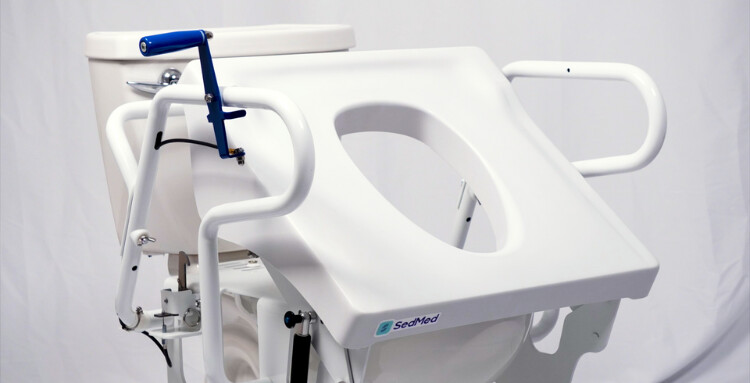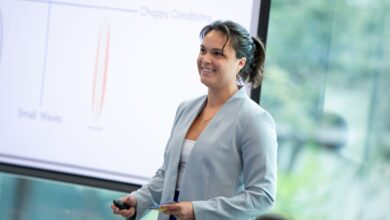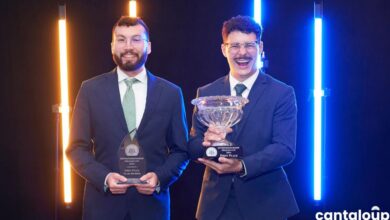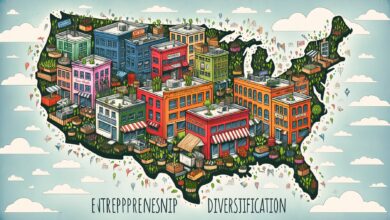The Toilet Entrepreneur » CBIA

Jeremy Bronen didn’t set out to be known as “the toilet entrepreneur.”
But four years after founding SedMed, that’s exactly what transpired.
“Essentially, we make toilet lifts to help older adults, people with disabilities get on and off the toilet,” Bronen told the CBIA BizCast.
The idea for the company came when Bronen was a mechanical engineering student at UConn.
Solving a Problem
While working on his senior capstone project, his sponsor told a story about an elderly woman he lived with, known as “Grandma Grace.”
“When he was a broke college kid at UConn, she took him in,” Bronen said.
“And one day, she suffered from a stroke, and became wheelchair bound, and was struggling to get around the house.”
“This is a much, much bigger problem than just this individual.”
SedMed’s Jeremy Bronen
Bronen said seeing Grandma Grace lose her independence and rely on a caregiver inspired his sponsor to create a toilet lift.
He said that senior design project helped him realized “this is a much, much bigger problem than just this individual.”
After graduating, Bronen got a job at another company, but kept working on the concept.
Simple Concept
Eventually, after winning several startup pitch competitions, he decided to leave his job and start SedMed.
“I said, ‘I can make a great company and help people.’ And you know, what better career is there than doing those two things?” Bronen said.
The concept behind the SedMed toilet lift is simple.
“I knew that a solution could solve this problem.”
Bronen
It mounts to any toilet and helps slowly lowers users down and locks for safety. When they are ready to get up, it lifts 80% of their body weight.
“I just saw this opportunity, I saw the problem,” Bronen said. “The problem was so big and I knew that a solution could solve this problem.”
Bronen said the product has evolved through multiple iterations, beginning with clunky electric motors to using mechanical gas springs similar to what are used in office chairs or car trunks.
‘Life Changer’
He said the key to improving and developing the product was getting feedback from key stakeholders.
“I’m not in healthcare, and I’m not a user,” he said. “I’m not an older adult, or a person with disabilities.”
“So getting their input on the product was critical for iterating. That’s really what formed each version of this.”
“It just is so rewarding to build a company where we can impact somebody’s life that greatly.”
Bronen
Bronen said he’ll never forget the first time he got a phone call from someone who used the toilet lift.
“’This is a life changer,’” Bronen recalled her saying. “’It’s a lifesaver. It reduced the pain in my knees. I’m unbelievably comfortable and independent.’”
“It just is so rewarding to build a company where we can get that type of reaction and impact somebody’s life that greatly,” he said.
Getting Off the Ground
Bronen added that originally, the concept and mission of SedMed was to help people and users.
But he said health systems, hospitals, and assisted living facilities really like the product because it not only helps patients, but also protects staff from injuries.
“We found, just through customer discovery and listening to our customers, that we had other value propositions that resonated pretty significantly,” he said.
An important piece of building SedMed was obtaining the funding and resources to get the company off the ground.
“There was serious pain, going through finding somebody that could help produce a prototype.”
Bronen
Part of that funding came last year, when they won a product development pitch competition put on by FORGE Connecticut.
The nonprofit connects entrepreneurs with product development assistance, experienced manufacturers, and supply chain resources.
“I wish I FORGE in my network when I started this,” Bronen said.
“There was serious pain, going through finding somebody that could help produce a prototype or production units very early on—lots of money, spent lots of time wasted for no results.
“And if FORGE was there, I know I would have had it down pat.”
Paying It Forward
Bronen also credits iCleanse CEO and CBIA board member Chris Allen with making SedMed a success.
Bronen said that he cold contacted and “pestered” Allen until he got a meeting.
“I demoed my product with the toilet, and my toilet lift on the side of the road in West Hartford to try to impress him and bring him on,” he said.
“I saw what he had done with his successes, and the more I talked to him also with his failures, and how much I could learn from both.”
“In entrepreneurship, there’s something amazing about the pay it forward mentality.”
Bronen
Since then, Allen has become an investor, advisor, and a board member.
Bronen said that, as an entrepreneur, it was key having mentors like Allen—something he tries to do for others.
“In entrepreneurship, there’s something amazing about the pay it forward mentality,” he said.
“So I mentor students and young startup companies as well.”
‘Incredible’ Journey
Bronen said it’s incredible to think about how quickly Sedmed has grown since he started the company in 2020.
“The progression of you know, a, we’ll say a functional prototype to a supply chain, fully built, was about 13 months, which is incredible,” he said.
SedMed now has three full-time and two part-time employees, with plans to grow.
“We would not be where we are today without the team we have behind us.”
Bronen
“We would not be where we are today without the team we have behind us,” he said.
“Going from engineering to figuring out my fundraising documents, raising money from investors, pitching investors—all that was brand new to me.
“But being resourceful and bringing in people that are smarter than me in all these industry areas has been really impactful in the journey and making it a lot easier,” he said.
The CBIA BizCast is made possible through the generous support of Google. Please rate, review, and subscribe to the BizCast wherever you get your podcasts—we appreciate your support! If you have a story to tell, contact Amanda Marlow.



